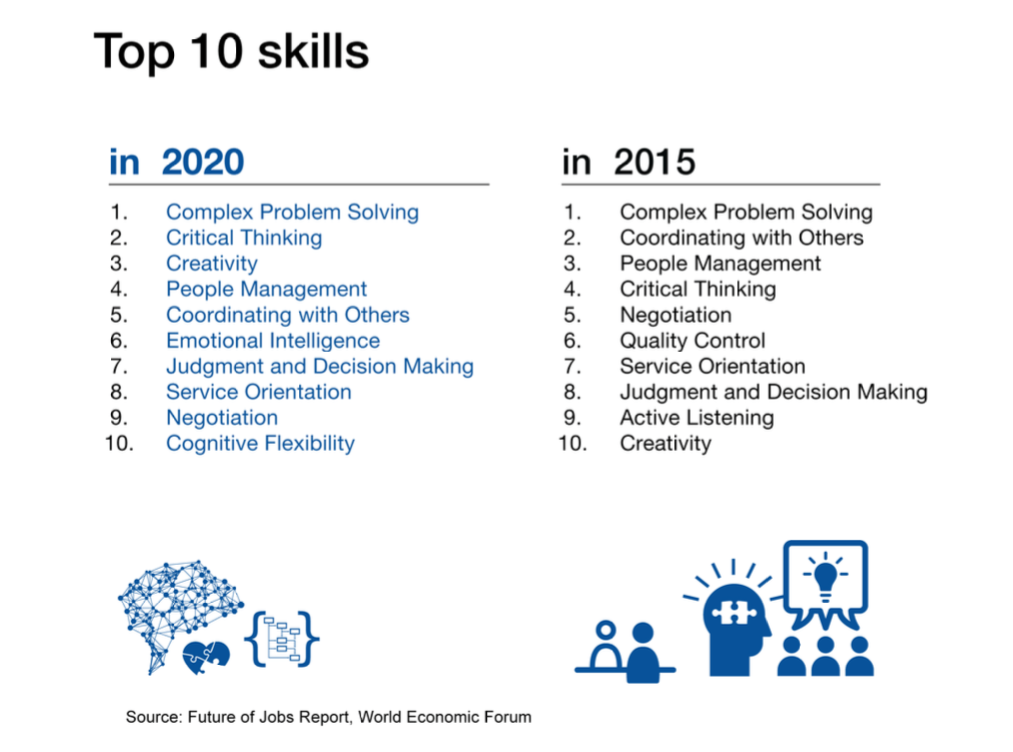The major problem managers face today is complexity, and the current business degrees and MBAs on offer are not equipping their graduates with the right knowledge and tools. Managers today must be able to understand how things interdepend and evolve in order to navigate complexity. In our previous post we proposed a solution for organizational design for complexity (see ‘Hierarchy: Transforming Into Something that Works Better‘). Here we propose a solution for management education.
Why MBAs are stuck in the past
Many business schools continue to offer the same curriculum to their students, even though they are aware that much of it is out of date. While students will always need to understand things like marketing, finance and how to read a balance sheet, business schools are not able to offer the subjects in a sufficiently integrated way for today’s reality. Why? Because like most organizations, schools are structured hierarchically and in silos. Even if schools consider themselves to be interdisciplinary, this structural limitation prevents them from innovating what they teach and the way they teach it in a significant way. Their courses are offered in ‘pieces’ that are then assembled together, but they never form a holistic whole.
A new kind of thinking
Managers today need to be able to think in a radically different way if they are to keep up with and anticipate change. A simplistic way of putting it is to say that they need to be able to connect the dots. An accurate way of describing this is to say they need to be able to think systemically. They need to have a holistic understanding of the reality they are in, they need to know that when they make a decision and act on that decision, there will be repercussions. Management education needs to provide them with a way to “see” those effects before they happen.
A new way of counting
The kind of management accounting that students are taught in MBAs is necessary because of the way tax reporting is done and balance sheets are written. However, it is not the most useful way of understanding cash coming in and cash coming out. When managers lose a sense of the real money they are handling (money in and money out) as opposed to more fluid accounting numbers, they can put an enterprise at risk.
A new way of understanding
A company is made up of processes, such as sales, production etc. These processes display a behaviour and this behaviour can be measured. There are statistical methods for understanding precisely whether a process is in statistical control or not. If a manager does not have this detailed level of understanding of the processes under their responsibility, then they cannot possibly know when and if it is the case to make changes for improvement. Without this knowledge, they risk doing more harm than good.
A new way of caring
Processes, apart form purely mechanical ones, are operated by humans. As humans, we have fears, desires, needs and a whole range of emotions. Managers need to be able to interact with their staff on an emotional level, with intelligent emotions. This kind of skill can be learned and developed.
Moreover, students today are actively interested in learning about business within the context of ethics and values, as an article by Jonas Haeckle, Head of PRME (Principles for Responsible Management Education) , a UN initiative, stated:
A recent survey has shown that over 75% of students believe all business schools should teach courses on ethics and sustainability. Meanwhile, 80% agreed that social responsibility and profitability can be compatible, and 77% say that companies should do a lot more for society and the environment.
A new curriculum
It’s not enough for schools to pay lip service to a new, more enlightened and ethical way of doing business and being a manager. They need to give students a way to make those legitimate desires operational. In order for a manager to act proficiently and effectively in today’s complex environments, they need to be able to understand and navigate complexity. They need to be able to deliver the purpose of their organization. Business degrees and MBA curricula today should therefore:
- enable a systemic understanding of organizations and the interdependencies they are part of
- teach systemic thinking skills for complexity
- teach accounting methods for throughput management
- teach statistical methods to understand and manage processes
- teach management skills to manage conflicts and interact with staff in a meaningful way
This curriculum for an MBA for complexity can be built right away with the Thinking Process Tools from the Theory of Constraints, Throughput Accounting, and statistical methods that have been around for decades. We already have all the material. We also take the opportunity of illustrating a new curriculum in detail in our new book ‘Quality, Involvement, Flow: The Systemic Organization’.
New skills
Schools need to prepare students for the new skills that are increasingly required.
Students already know that expensive business school programs are not providing everything they really need today. The question is, how long will it take business schools to understand they need to offer this kind of program?
Sign up to our blog here and shift your thinking towards broader, systemic possibilities for yourself and your organization.
About the Author
Angela Montgomery Ph.D. is Partner and Co-founder of Intelligent Management, founded by Dr. Domenico Lepore. She is co-author with Dr. Domenico Lepore and Dr. Giovanni Siepe of ‘Quality, Involvement, Flow: The Systemic Organization’ from CRC Press, New York. Angela’s new business novel+ website The Human Constraint looks at how the Deming approach and the Theory of Constraints can create the organization of the future, based on collaboration, network and social innovation.






Leave a Reply